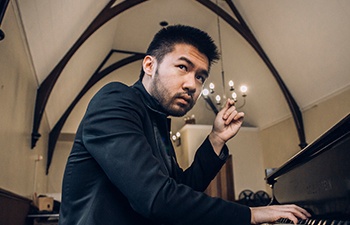Review: SAN DIEGO SYMPHONY CONCERT at Jacobs Music Center

Guest Conductor David Danzmayr led the San Diego Symphony with unusual intensity in a program of one new work and two familiar favorites. Forceful skyward thrusts demanded full power when needed, and an active left hand called for expressive playing. The orchestra responded with performances that brought a range of satisfying effects from compelling excitement to wistful tenderness.
The program opened with the world premiere of Hands of Mist, by Javier Álvarez. Commissioned by the San Diego Symphony, the work paints an emotional musical picture of the confusing world faced by those immigrating to the United States from the South. Sometimes reaching near cacophony, Álvarez builds atmosphere and tension in the first of three parts as boisterous modern orchestral sounds are mixed with suggestions of a train in motion and bursts of Latin melodies and rhythms. In the second part a boy soprano enters to sing the text of the poem that inspired the piece. It is by United States Poet Laureate Juan Felipe Herrera. The boy, alternating between Spanish and English as he sings, sounds frail against a continuing tumultuous instrumental background. "I am the lost child between furious towers between two flags ..." When the poem completes, the boy's despairing voice disappears, and broiling, conflicting motifs continue unresolved.
Twenty minutes of continuously aggressive music, changing rhythms, snatches of incomplete melodies, and an unmelodic vocal part make a clear statement. Arms of Mist is indeed an ingenious depiction of immigration's emotional impact, and a clear, affecting plea for greater empathy, especially for the children affected. But, out of context, the very techniques that make it so effective as a political and moral statement make it less attractive as a purely musical experience. Kudos nonetheless to the San Diego Symphony for commissioning this powerful statement on one of today's most controversial societal issues.
Tchaikovsky's first piano concerto is a decided "warhorse." But if some didn't buy a ticket because they think they've heard it too often, they made a mistake. Conrad Tao's nearly unbelievable performance proved warhorses can still be worth trotting out. Tao's roaring octaves, poetic feather-light runs, and astounding speed and accuracy must be sending many professionals home in a state of frustrated envy and causing amateurs to give it up altogether. Maestro Danzmayr paid attention to what was going on at the keyboard, and the orchestra and pianist were in synch throughout a truly exciting performance. During an extended ovation from an audience that had leapt to its feet, the young pianist received an equally appreciative hug from the Maestro.
Tao was minus his jacket when he returned to the stage for an encore. The black  short-sleeved tee he'd had underneath remained to make him look even younger than his 24 years. He sat down, pivoted on the bench to the audience and got a big laugh when he announced he'd be playing a fugue from Bach's Sonata No. 3 for solo violin. And that he did, though not on the violin, with a thoughtfully tender approach that seemed to bring Bach forward over 200 years to the Romantic Era.
short-sleeved tee he'd had underneath remained to make him look even younger than his 24 years. He sat down, pivoted on the bench to the audience and got a big laugh when he announced he'd be playing a fugue from Bach's Sonata No. 3 for solo violin. And that he did, though not on the violin, with a thoughtfully tender approach that seemed to bring Bach forward over 200 years to the Romantic Era.
Many Russian composers who worked under Stalin's watchful eye, including Prokofiev, lived with more than their share of controversy. They faced physical threats if their music displeased the regime and hostile critical reaction from Western critics if it didn't. Prokofiev's reputation, unfairly I believe, has been hurt by the view that he knuckled under and compromised his musical integrity. He did indeed produce a few over-the-top patriotic pieces, no doubt partly to appease the regime. But he was in fact a patriot and also a former spoiled child prodigy who couldn't stand the thought that other composers might be better at something than he was, even if what they were better at was turning out blatantly politically inspired works. He displayed his need to be the best from the beginning, competing with Haydn when he wrote his first symphony, "The Classical." And when Stravinsky achieved both praise and notoriety for Rite of Spring, Prokofiev responded with the Scythian Suite to show he could write music of even greater pagan brutality.
His seventh symphony, written while he was ill and almost certainly knew he was dying, doesn't try to prove anything. It is immediately appealing, full of his genius for melody. The opening movement sets the tone. The first theme seems resigned, yet the second is filled with soaring beauty. The following movement approaches the simple naïve buoyancy of Peter and the Wolf. The third is introspective and wistful. The final movement bubbles with childlike joy before an unexpected return of the poignant soaring second theme of the first movement. And then clock-like percussion and pizzicato in the strings foreshadow the closing notes, resigned acceptance of the end.
When some expressed disappointment in the ending, Prokofiev wrote an upbeat alternative. Danzmayr chose the original ending, a more appropriate one given the composer's health and personal problems as he wrote the symphony. The conductor consistently made intelligent choices throughout the piece, and the San Diego musicians followed him alertly to deliver a fine performance of an underappreciated work.
Visit the San Diego Symphony website for a schedule of concerbs remaining in the 2018-19 season.
Photos courtesy San Diego Symphony.
Reader Reviews
Videos

